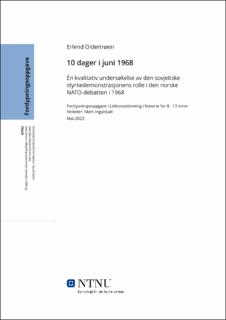10 dager i juni 1968
Bachelor thesis
Permanent lenke
https://hdl.handle.net/11250/3074574Utgivelsesdato
2023Metadata
Vis full innførselSamlinger
Sammendrag
I 1949 ble NATO, eller North Atlantic Treaty Organization, opprettet som en respons til den kommunistiske stormakten Sovjetunionen. Avtalen innebar at ethvert angrep mot en av de tolv medlemslandene - Norge, Belgia, Canada, Danmark, Frankrike, Island, Italia, Luxembourg, Nederland, Portugal, Storbritannia og USA - var et angrep eller en krigserklæring mot alliansen som helhet. Selv om forsvarsalliansen ga Norge trygghet i en spenningsfylt tid, innebar det også en bindende kontrakt som først ville kunne reforhandles etter 20 år.19 år senere, på samme tid som norske politikere gjorde seg klar til NATO-debatt, gjorde Sovjet sine helt egne forberedelser på andre side av grensen. Resultatet ble den største provokasjonen av det norske territoriet siden andre verdenskrig. Denne oppgaven har som hensikt å undersøke hvilken rolle, om noen, den sovjetiske styrkedemonstrasjonen hadde for debatten om fortsatt norsk NATO-medlemskap. Dette innebærer blant annet de politiske partienes holdninger, politikernes retorikk og tilgang til offentlig informasjon om situasjonen i Øst-Finnmark. In 1949 the North Atlantic Treaty Organization (NATO) was founded as a response to the superpower of the Soviet Union.The was constructed on the principle that an attack on one of the twelve membering states - Norway, Belgium, Canada, Denmark, France, Iceland, Italy, Luxembourg, the Netherlands, Portugal, Great Britain and the United States - was an attack or a declaration of war against the alliance as a whole.Although the collective defense gave Norway increased military capabilities in a time characterized by instability and fear, the membership also entailed a binding contract between the allies that could only be renegotiated after 20 years.
19 years later, the Norwegian politicians found themselves preparing for the debate at the same time as the Soviet Union did their own groundwork on the other side of the border. A groundwork that ended up being the largest provocation of Norwegian territorial borders since the Second World War.
The thesis seeks to examine which role, if any, the confrontation at the Norwegian-Russian border had on the Norwegian NATO debate. Moreover, the study examined how the access to public information about the situation in Eastern Finnmark, the political disagreements and rhetoric affected the debate.
